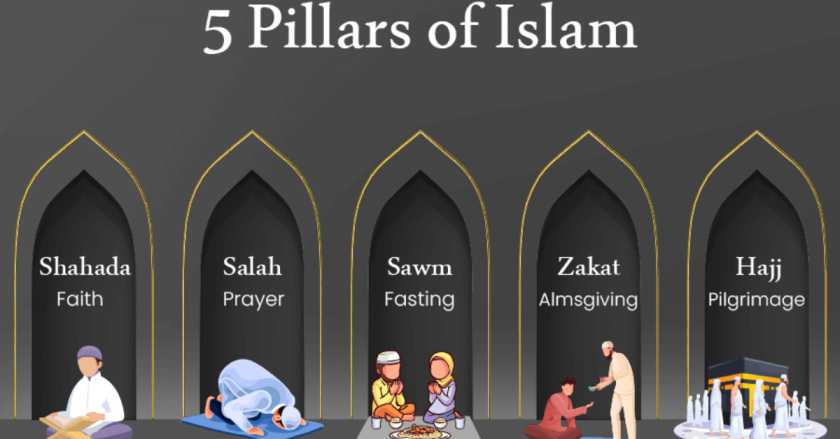Master the 5 Pillars of Islam: Elevate Your Faith or Miss Out on Eternal Reward -2025

Islam is built upon five foundational acts of worship known as the Five Pillars of Islam. These pillars serve as the framework of a Muslim’s life, shaping one’s spiritual, ethical, and social existence. They are not mere rituals but are deeply meaningful practices that nurture the soul and promote a harmonious society.
Let’s take a deep dive into each of these pillars to understand their significance and how they guide the daily life of a believer.
1. Shahada (Declaration of Faith)
“There is no god but Allah, and Muhammad is the Messenger of Allah.”
The Shahada is the very entry point into Islam. It is a simple yet profound declaration that testifies to the oneness of God and the finality of the Prophethood of Muhammad ﷺ.
Why it matters:
This statement is not just verbal; it is a lifelong commitment. It demands that one’s heart, actions, and beliefs align with the acknowledgment that Allah alone is worthy of worship. Declaring Muhammad ﷺ as the Messenger means committing to follow his example in all aspects of life.
Spiritual impact:
Shahada cleanses the soul of shirk (associating partners with Allah) and aligns the heart with divine truth. It fosters humility and total submission to the Creator.
2. Salah (Prayer)
“Indeed, prayer has been decreed upon the believers a decree of specified times.”
(Surah An-Nisa 4:103)
Salah is the daily ritual prayer performed five times a day — at dawn (Fajr), midday (Dhuhr), afternoon (Asr), sunset (Maghrib), and evening (Isha). Each prayer is a direct connection between the believer and Allah.
Why it matters:
Salah instills discipline, mindfulness, and regular remembrance of Allah. It removes spiritual rust and renews one’s commitment to live righteously throughout the day.
Spiritual impact:
Through regular prayer, a Muslim experiences spiritual growth, inner peace, and a strong sense of accountability. The act of bowing and prostrating cultivates humility and closeness to Allah.
“Prostrate and draw near [to Allah].”
(Surah Al-‘Alaq 96:19)
Pro tip: Build khushoo’ (focus) by understanding the meanings of what you recite during prayer.
3. Zakat (Obligatory Charity)
“Take from their wealth a charity by which you purify them and cause them increase…”
(Surah At-Tawbah 9:103)Zakat is the annual charity due from every eligible Muslim, typically 2.5% of one’s saved wealth. It is not merely a donation but a divine obligation.
Why it matters:
Zakat cleanses the heart from greed and selfishness. It is a powerful tool for social justice and wealth redistribution. It helps the poor, the needy, and others in debt or hardship.
Spiritual impact:
Giving in the way of Allah increases barakah (blessing) in one’s wealth. It shifts a person’s mindset from hoarding to giving, from owning to sharing. It is a way of thanking Allah for the blessings we enjoy.
Did you know?
Zakat is mentioned in the Qur’an alongside prayer over 30 times — showing its immense importance.
4. Sawm (Fasting in Ramadan)
“O you who have believed, decreed upon you is fasting as it was decreed upon those before you that you may become righteous.”
(Surah Al-Baqarah 2:183)
Sawm refers to the fasting in the month of Ramadan, where Muslims abstain from food, drink, and sinful behavior from dawn till sunset.
Why it matters:
Fasting teaches self-control, empathy for the less fortunate, and gratitude for what we have. It is not just a physical act but a spiritual detox.
Spiritual impact:
The hunger felt during fasting reminds one of the needs of others. The nights of Ramadan, especially with Taraweeh prayers and recitation of Qur’an, bring immense closeness to Allah. Laylat al-Qadr, the Night of Decree, falls in the last ten nights and is better than a thousand months.
Tips to make the most of Ramadan:
- Start journaling your spiritual goals
- Give regular charity
- Focus on dua and Qur’an recitation
5. Hajj (Pilgrimage to Makkah)
“And [due] to Allah from the people is a pilgrimage to the House – for whoever is able to find thereto a way.”
(Surah Al-Imran 3:97)
Hajj is a once-in-a-lifetime obligation for those who are financially and physically able. Performed in the month of Dhul Hijjah, it gathers Muslims from all walks of life to worship Allah together.
Why it matters:
Hajj is the ultimate expression of unity and submission. It commemorates the sacrifices of Prophet Ibrahim (AS), his wife Hajar, and their son Ismail (AS). The rituals like Tawaf (circling the Kaaba), Sa’i (walking between the hills of Safa and Marwah), and standing at Arafah carry deep historical and spiritual meaning.
Spiritual impact:
The experience strips one of material status — all wear the same white cloth (Ihram), symbolizing equality and humility before Allah. A sincere Hajj erases past sins and gives one a chance to start anew.
“Whoever performs Hajj for the sake of Allah…will return as a newborn baby [free of sins].”
(Hadith – Bukhari & Muslim)
Conclusion
The Five Pillars of Islam are not just rituals — they are a comprehensive way of life. They remind us daily, monthly, and yearly of our purpose, our Creator, and our responsibility to ourselves and society.
Each pillar strengthens different aspects of our being:
- Shahada builds faith
- Salah maintains discipline
- Zakat fosters social balance
- Sawm trains self-control
Hajj unites the ummah and renews spirituality
Let us not only perform them, but understand and live them with sincerity. When these pillars become the foundation of our lives, they elevate our character, purify our hearts, and bring us closer to the ultimate goal — pleasure of Allah and eternal success in the Hereafter.
More blogs Struggling or Thriving? Discover the Powerful Way to Connect with Allah -2025

